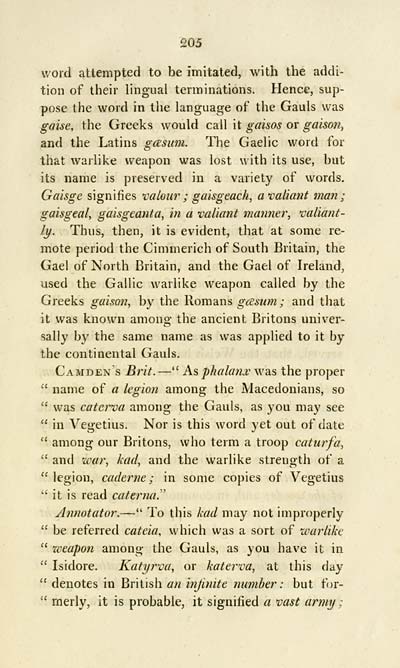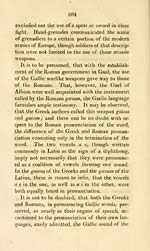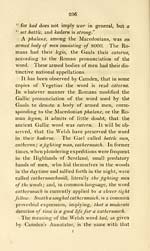Download files
Complete book:
Individual page:
Thumbnail gallery: Grid view | List view

205
word attempted to be imitated, with the addi-
tion of their lingual terminations. Hence, sup-
pose the word in the language of the Gauls was
gaise, the Greeks would call it gaisos or gaiso?i,
and the Latins gasum. The Gaelic word for
that warlike weapon was lost with its use, hut
its name is preserved in a variety of words.
Ga'isge signifies valom^ ; gaisgeach, a valiant mafi ;
gaisgeal, gaisgeanta, in a valiant manner, valiant-
ly. Thus, then, it is evident, that at some re-
mote period the Cimmerich of South Britain, the
Gael of North Britain, and the Gael of Ireland,
used the Gallic warlike weap(m called by the
Greeks gaison, by the Romans gcesum ; and that
it was known among the ancient Britons univer-
sally by the same name as was applied to it by
the continental Gauls.
Camden s Brit. — " As phalafLv was the proper
" name of a legion among the Macedonians, so
" was caterva among the Gauls, as you may see
" in Vegetius. Nor is this word yet out of date
" among our Britons, who term a troop catm^fa,
" and war, kad, and the warlike strength of a
" legion, caderne ; in some copies of Vegetius
" it is read caterna.''
Annotator. — " To this kad may not improperly
" be referred cateia, which was a sort of warlike
" weapon among the Gauls, as you have it in
" Isidore. Katyrva, or katerva, at this day
" denotes in British an injinite number : but for-
" merly, it is probable, it signified a vast army :
word attempted to be imitated, with the addi-
tion of their lingual terminations. Hence, sup-
pose the word in the language of the Gauls was
gaise, the Greeks would call it gaisos or gaiso?i,
and the Latins gasum. The Gaelic word for
that warlike weapon was lost with its use, hut
its name is preserved in a variety of words.
Ga'isge signifies valom^ ; gaisgeach, a valiant mafi ;
gaisgeal, gaisgeanta, in a valiant manner, valiant-
ly. Thus, then, it is evident, that at some re-
mote period the Cimmerich of South Britain, the
Gael of North Britain, and the Gael of Ireland,
used the Gallic warlike weap(m called by the
Greeks gaison, by the Romans gcesum ; and that
it was known among the ancient Britons univer-
sally by the same name as was applied to it by
the continental Gauls.
Camden s Brit. — " As phalafLv was the proper
" name of a legion among the Macedonians, so
" was caterva among the Gauls, as you may see
" in Vegetius. Nor is this word yet out of date
" among our Britons, who term a troop catm^fa,
" and war, kad, and the warlike strength of a
" legion, caderne ; in some copies of Vegetius
" it is read caterna.''
Annotator. — " To this kad may not improperly
" be referred cateia, which was a sort of warlike
" weapon among the Gauls, as you have it in
" Isidore. Katyrva, or katerva, at this day
" denotes in British an injinite number : but for-
" merly, it is probable, it signified a vast army :
Set display mode to: Large image | Transcription
Images and transcriptions on this page, including medium image downloads, may be used under the Creative Commons Attribution 4.0 International Licence unless otherwise stated. ![]()
| Early Gaelic Book Collections > Ossian Collection > Thoughts on the origin and descent of the Gael > (217) |
|---|
| Permanent URL | https://digital.nls.uk/82237048 |
|---|
| Description | Selected books from the Ossian Collection of 327 volumes, originally assembled by J. Norman Methven of Perth. Different editions and translations of James MacPherson's epic poem 'Ossian', some with a map of the 'Kingdom of Connor'. Also secondary material relating to Ossianic poetry and the Ossian controversy. |
|---|
| Description | Selected items from five 'Special and Named Printed Collections'. Includes books in Gaelic and other Celtic languages, works about the Gaels, their languages, literature, culture and history. |
|---|

